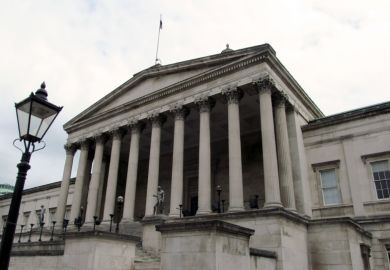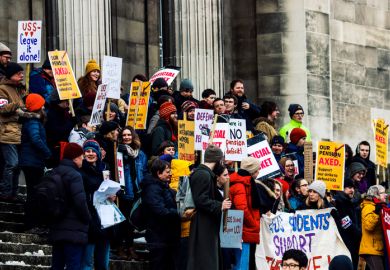A UCL employee who was disciplined for taking part in trade union activities, according to an employment tribunal, has said that his treatment has had a “chilling effect” on industrial relations at the university.
UCL has appealed against the tribunal ruling in favour of Tony Brown, an IT systems administrator, with the latest hearing set to take place next month.
A motion carried at last month’s University and College Union congress called on the national executive committee to declare the matter a “dispute of national significance”.
Meanwhile, a petition sent to UCL’s president, Michael Arthur, calling on the institution to drop the “senseless appeal process and respect trade union rights”, has attracted hundreds of signatures.
The dispute centres on UCL’s decision to introduce moderation on an all-staff email distribution list in its information services division, which had been unmoderated for more than 14 years. The move meant that all messages had to be approved before being circulated.
When Mr Brown, the UCU branch secretary at UCL, created a new email list, management told him to take it down but he refused.
A disciplinary hearing in March 2017 resulted in him receiving an oral warning, a sanction upheld at an appeal in June the same year.
Mr Brown, who has worked at UCL since 2007, took the university to the employment tribunal, claiming that he had been unlawfully disciplined because he took part in trade union activities.
UCL argued that he had been given the warning for “wilfully disobeying” a reasonable management request.
The tribunal concluded that Mr Brown “was undertaking trade union activities in setting up a replacement open email list and in refusing to take it down, in order to preserve the free flow of communication on behalf of the union, which had pertained for at least the previous 14 years”.
On a balance of probabilities, the main motive “for changing to a moderated list to which only management could freely post, was to stem the free ‘venting’ on disputed issues between management and unions”, the tribunal ruled.
From the union’s point of view, the moderation “smacked of censorship and the shutting down of any dissenting voices”, said the judgment.
Mr Brown could be due compensation but the UCL appeal has put any remedy on hold.
“Clearly it’s an unpleasant situation to find yourself in for a long period of time,” he told Times Higher Education. “It is clear victimisation…it’s had a chilling effect, I think it would be fair to say, on industrial relations at UCL; it’s made everything we do a lot harder.
“The agenda has always been about controlling communication in the organisation and ensuring that varying layers of managers in UCL have complete control of the airwaves.”
The dispute came against the backdrop of staff unrest at UCL over the university’s £483 million plan to build a new campus in east London.
A spokesman for UCL said that the university would not be commenting because of the appeal but was “committed to engaging in constructive discussions to find a solution”.
Register to continue
Why register?
- Registration is free and only takes a moment
- Once registered, you can read 3 articles a month
- Sign up for our newsletter
Subscribe
Or subscribe for unlimited access to:
- Unlimited access to news, views, insights & reviews
- Digital editions
- Digital access to THE’s university and college rankings analysis
Already registered or a current subscriber?








